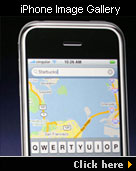Cisco sues Apple over iPhone name



update Cisco Systems has fired the first shot in the war over the iPhone name filing a lawsuit against Apple on Wednesday in the US for infringing its trademark.
Cisco has owned the iPhone trademark since the year 2000 after acquiring a company called Infogear, which sold iPhone products for several years. And just last month, Linksys a divsion of Cisco, launched a line of VoIP handsets all carrying the iPhone name.
Yet, Apple's Steve Jobs went ahead with the announcement of an iPhone in his keynote speech at Macworld 2007, currently underway in San Francisco.
Cisco said in the complaint that Apple had attempted to get rights to the iPhone name several times, but after Cisco refused, the company created a front company to try to acquire the rights another way, according to the lawsuit.
"Cisco entered into negotiations with Apple in good faith after Apple repeatedly asked permission to use Cisco's iPhone name," Mark Chandler, senior vice president and general counsel at Cisco, said in a statement. "There is no doubt that Apple's new phone is very exciting, but they should not be using our trademark without our permission."
Cisco has said it was seeking an injunctive relief to prevent Apple from copying its iPhone trademark, according to a CNET News.com blog post.
Fresh off one of the biggest launches in its history, a product Apple CEO Steve Jobs called one of the most exciting products he's ever worked on, the company dug in its heels. "We think Cisco's trademark suit is silly...We believe their trademark registration is tenuous at best," said Natalie Kerris, an Apple spokeswoman.
"There are already several companies using the iPhone name for VoIP [voice over IP] products," Kerris said. "We're the first company ever to use iPhone for a cell phone. If Cisco wants to challenge us on it, we're confident we'll prevail."
Cisco said in its complaint that Apple had first approached the company about acquiring the rights to the iPhone trademark in 2001. Over the years, Apple continued to make requests for the rights, including several attempts in 2006, Cisco said.
"Each time, Apple was told that Cisco was not interested in ceding the mark to Apple," Cisco's complaint reads.
Apple apparently was not willing to accept Cisco's decision, so it created a Wilmington, Del.-based front company called Ocean Telecom Services that applied to use the trademark in the US on September 26, 2006, according to Cisco's complaint. That company, Cisco says in the filing, is "owned or otherwise controlled by Apple and is the alter ego of Apple." Around the same time on September 19, 2006, Apple also filed for the trademark for iPhone in Australia.
However, it's likely that the two companies will settle their differences, as prolonged litigation doesn't really serve either company, Kay said. "Apple is playing chicken with Cisco, and there's other companies I'd rather play chicken with," he said, referring to Cisco's deep pockets.
Cisco holds a clear advantage in the legal dispute as the trademark holder of record and having already released products using the iPhone name, said Bruce Sunstein, co-founder of the Boston law firm Bromberg & Sunstein. "The one who has a registration is in a better position than the one who does not."
Apple's only choice is to argue that their "iFamily" of trademarks such as iPod, iTunes and iMac create confusion in a customer's mind as to who makes the iPhone, Sunstein said. It's not out of the question, but in general the company in Cisco's position with clear rights to the trademark has a stronger argument than a company making the family argument, he said.
Also, the applications for trademarks in other countries have no bearing on Cisco's iPhone trademark, Sunstein said. "The fact that Apple may have superior rights in Australia doesn't [give] them any rights in the US," he said.
